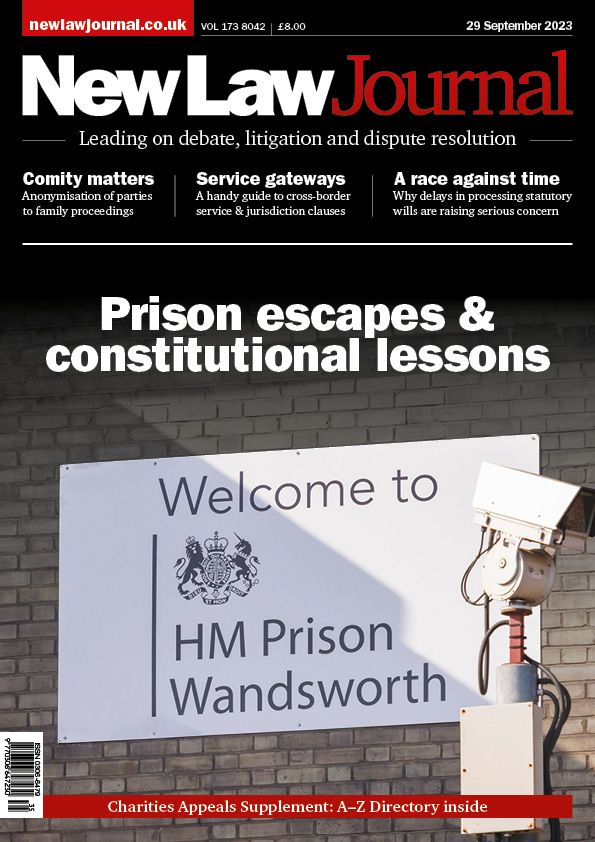THIS ISSUE

William Gibson explains how a high-society pool party brought down a government
In the first of two articles on anonymisation in family proceedings, David Burrows considers what is meant by judicial comity across all courts
Maurice MacSweeney explains the main elements funders take into consideration
Roger Smith muses on breakouts, scapegoats & political expediencies
Delays in the processing of statutory wills are causing serious issues with estate distribution: Gareth Williams proposes a simple solution
Janna Purdie provides a handy guide to cross-border service & jurisdiction clauses
Using foul language on social media is fine but posting dishonest or discriminatory material online is not, according to guidance issued by the Bar Standards Board (BSB)
Cafcass has this week activated its prioritisation protocol for the London area following discussions with judges in West London, East London and the Central family courts
NLJ's latest Charities Appeals Supplement has been published in this week's issue
MOVERS & SHAKERS

Penningtons Manches Cooper—Robert Dransfield
London medical negligence practice strengthened by senior partner hire
.tmb-mov69x69.jpg?sfvrsn=87f6371e_1)
DAC Beachcroft—seven appointments
Firm boosts professional risk practice with team hire in Manchester, led by partner Ben Parks

Doyle Clayton—Benedicte Perowne
Workplace law firm appoints new head of regulatory team
NEWS
Cheating in driving tests is surging—and courts are responding firmly. Writing in NLJ this week, Neil Parpworth of De Montfort Law School charts a rise in impersonation and tech-assisted fraud, with 2,844 attempts recorded in a year
As AI-generated ‘deepfake’ images proliferate, the law may already have the tools to respond. In NLJ this week, Jon Belcher of Excello Law argues that such images amount to personal data processing under UK GDPR
In a striking financial remedies ruling, the High Court cut a wife’s award by 40% for coercive and controlling behaviour. Writing in NLJ this week, Chris Bryden and Nicole Wallace of 4 King’s Bench Walk analyse LP v MP [2025] EWFC 473
A €60.9m award to Kylian Mbappé has refocused attention on football’s controversial ‘ethics bonus’ clauses. Writing in NLJ this week, Dr Estelle Ivanova of Valloni Attorneys at Law examines how such provisions sit within French labour law
A seemingly dry procedural update may prove potent. In his latest 'Civil way' column for NLJ this week, Stephen Gold explains that new CPR 31.12A—part of the 193rd update—fills a ‘lacuna’ exposed in McLaren Indy v Alpa Racing






